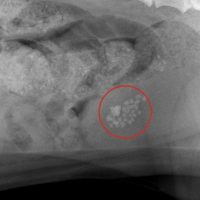The old adage, “An ounce of prevention is worth a pound of cure,” can be directly applied to canine health care. Avoiding an illness is always better than treating it, and when it cannot be avoided, intervention is always more effective if started sooner rather than later. Since dogs age faster than humans, an annual veterinary exam with diagnostic testing is equivalent to a human visiting the doctor every four to five years. The rapid aging process of dogs makes preventive health care even more important.
What are preventative healthcare guidelines?
To standardize veterinary care for dogs and cats, AAHA (American Animal Hospital Association) and the AVMA (American Veterinary Medical Association) gathered medical information from various specialty groups, some of which include the American Heartworm Society, American Association of Feline Practitioners, and Companion Animal Parasite Council, and devised the “Canine Preventive Healthcare Guidelines” (CPHG).
What are the CPHG recommendations and why are they important?
Below is an overview of some recommendations included in the CPHG and how they relate to you and your dog:
History. A discussion of your dog’s home life will give your veterinarian an overall idea of your pet’s health status. Changes in your dog’s demeanor may occur so gradually that you are not aware of them until you are asked specific questions. Does your dog have a good appetite and regular bowel movements? Does your dog strain to urinate? Limp? Slow to rise when lying down? Does your dog ever seem short of breath, cough, sneeze, or seem itchy? Does your pet drink a lot? Your answers will be recorded at each visit so your veterinarian can identify changes that are otherwise difficult to notice on a day-to-day basis.
“Changes in your dog’s demeanor may occur so gradually that you are not aware of them.”
Examinations. Even healthy dogs should be examined by a veterinarian at least once a year, preferably twice a year. If your dog is older or has medical problems, more frequent visits may be necessary. Physical exams can detect heart murmurs or skipped heartbeats, enlarged lymph nodes, skin and/or abdominal tumor, and enlarged or shrunken kidneys, liver, or spleen that may indicate systemic disease. A look at the eyes can determine your dog’s visual capacity. An orthopedic evaluation can tell if your dog is arthritic and in need of pain medication. An evaluation of the skin and coat will determine the need for flea and tick control or diagnose skin infections (bacterial, fungal, or parasitic). Hair loss may indicate systemic disease or hormonal imbalances.
Testing. Although heartworms are more prevalent in warmer climates where mosquitoes thrive, infected dogs live in every state and in many parts of Canada. Even dogs in cold environments can get heartworms, so The American Heartworm Society advises annual heartworm blood testing, as well as year-round heartworm preventative medication. Intestinal parasites can affect both dogs and humans, so a stool sample should be analyzed at least once (preferably twice) a year. To diagnose organ malfunctions in the early stages, blood tests (complete blood count, chemistry panel, and thyroid screen) and urinalysis should be performed annually. If problems are diagnosed, more frequent testing may be necessary. For dogs in areas where ticks are prevalent, including our area here in South Central Kentucky, screening for vector-borne diseases like Lyme disease or ehrlichiosis are advised.
“The American Heartworm Society advises annual heartworm blood testing.”
Dental care. It is a well-known fact that oral health impacts a dog’s general health. Simply put, dogs with clean mouths live longer. The bacteria involved in periodontal disease do not just stay in the mouth. These organisms invade the bloodstream and travel to major organs like the kidneys, liver, and heart where they cause significant health issues. Dogs may need their teeth cleaned every year, but this frequency can vary depending on several factors including preventive care and routine at-home maintenance (i.e., daily brushing). Dental radiographs (X-rays) will help determine the status of oral disease. Regular dental cleanings will keep your dog’s oral health in good condition.
Parasite prevention. Dogs should be given medication to prevent heartworms all year long in endemic areas. Many heartworm medications also prevent or treat intestinal parasites, and some may also treat fleas and ticks. Your veterinarian can provide these medications and a parasite prevention protocol can be tailored to your dog.
Immunizations. Vaccinations are divided into two groups: core vaccines and non-core (optional) vaccines. All dogs considered stable and healthy to vaccinate should be immunized for rabies, distemper, canine parvovirus, canine adenovirus-2 (hepatitis), and leptospirosis (usually offered as a combined DHLPP vaccination). Vaccination for kennel cough, Lyme disease, and canine influenza may be recommended for dogs with potential exposure to these diseases.
“Research has shown that leaner dogs live longer and have fewer health problems.”
Weight maintenance. Research has shown that leaner dogs live longer and have fewer health problems. Your veterinarian will assign a body condition score to your dog and give you dietary and exercise recommendations to help your dog maintain a healthy body condition score.
Spaying/Neutering. Spaying or neutering can have numerous health or behavior benefits. Having this surgery done can prevent infections and some types of cancer. Your veterinarian will discuss these benefits and the timing of the surgery for your dog.
Diagnosing canine illnesses. Dogs have innate survival instincts that give them the ability to hide pain and illness well (so as not to seem vulnerable to predators). Since a veterinarian cannot simply ask your dog how she is feeling or see what is going on inside her body, thorough physical examinations with disease screening tests such as blood work and urinalysis can help your veterinarian determine if your dog is at risk for developing a condition that can still be prevented, or if a condition is already there, your veterinarian can diagnose it and treat it early.
© Copyright 2022 LifeLearn Inc. Used and/or modified with permission under license.






